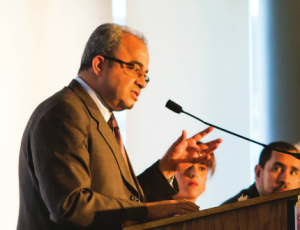
Former visiting professor Emad Shahin, an Egyptian political scientist, has been charged with espionage in conjunction with several other dissidents by the army-controlled Egyptian government, he revealed in a Jan. 23 letter.
Shahin, who specializes in political Islam, currently teaches at the American University in Cairo and has been openly critical of the July military coup that removed the elected president, Muslim Brotherhood politician Mohamed Morsi, from power and instated martial rule.
The charge sheet, on which Shahin is listed as “Defendant 33,” includes espionage, leading an illegal organization, providing a banned organization with information and financial support, calling for the suspension of the constitution, preventing state institutions and authorities from performing their functions, harming national unity and social harmony and causing to change the government by force.
The accusations were filed several weeks ago, but Shahin, who was at Georgetown for Wednesday’s “Egypt and the Struggle for Democracy” conference at the Alwaleed Bin Talal Center for Muslim-Christian Understanding, brought them to light in his letter, entitled “Statement to my Students, Family and Friends.”
“I categorically and emphatically deny all the charges, and I challenge the state security prosecutor to present real evidence to substantiate these fabricated charges. I am an academic and have been independent throughout my life. I am an advocate for democracy, the rule of law, human rights and a fervent supporter of the main objectives of the Jan. 25 Revolution in Egypt, namely freedom, dignity and social justice,” Shahin wrote.
Thirteen of Shahin’s Georgetown colleagues drafted a letter to Egyptian Prime Minister Hazem Al-Beblawi, appealing the decision to indict Shahin in the case, which also names charges against Morsi and senior leaders of the Muslim Brotherhood.
“It reflects poorly on the government of Egypt that his constructive and nonpartisan criticism of political events has seemingly led to this attempt to silence him,” the letter, dated Jan. 28, stated.
Rachel Pugh, the university’s director of media relations, declined to comment on the charges.
“It would not be appropriate to comment on the charges,” she wrote in an email.
The letter represents the concerns of individual scholars, not the university
“We’re speaking up because we hope that if a lot of people speak up and point to the absurdity of these charges that the government will reconsider and drop the charges. That’s what you would hope for, but of course there are other less pleasant scenarios,” history professor Judith Tucker said.
Those familiar with Shahin’s work asserted the impossibility of the validity of the charges.
“Professor Shahin was never affiliated with the Brotherhood. He is seen as a threat to the current regime because he is an intellectual voice of reason that has a following abroad, not because he actually committed espionage or treason. That is just ridiculous,” ACMCU Director John Esposito said.
Shahin’s passion for Egypt and its history remains unquestioned by those at Georgetown.
“Emad has always been a proponent for democracy and just government. He left a great job in South Bend, [Ind.,] to work at the American University in Cairo because he believes in the importance of educating future leaders in his country,” Esposito said. “He cares very much about Egypt and the road that the nation is going down in the aftermath of the coup and the revolution.”
Shahin’s scholarship and interest in the future of Egypt remain the primary suspicion for his indictment, as his prescription for a functioning Egypt involves criticisms of the current political situation.
“I have been critical of the course of political events in Egypt since last summer and can only conclude that such criticism — entirely restricted to word and utterly unconnected to any organized group, faction or party — is my true offense,” Shahin wrote. “Like many fellow Egyptians, I am supportive of peaceful mobilization in defense of democracy, freedom, equal rights, and inclusion. I will continue to advocate such values, exercising a right to protest that is enshrined in Egyptian law and, in recent years, deeply engrained in Egyptian practice.”
Shahin would not comment on his case, but spoke to The Hoya at the conference about the general political climate in Egypt.
“There are some voices here and there that are expressing discontent or displeasure, but not to the extent that can mount significant pressure on the military-backed government that can force them to respect human rights and the basic, basic values of democracy,” Shahin said.
Concern for Shahin’s safety is paramount among Georgetown faculty, as it remains unclear if he can return to Egypt safely.
“You worry for these people because these are serious charges, these are charges that could bring serious punishment down on their heads and they’re really just for the purposes of silencing all dissident voices,” Tucker said.
Accusations like the ones leveled at Shahin are rare in the United States, where Shahin holds citizenship, but occur more frequently in Egypt.
“The specificity of Shahin’s case is this is someone who is an American citizen, as well as a well-known academic scholar, but not unique in being persecuted for presenting a balanced analysis of modern Egyptian affairs,” John Voll, a professor of Islamic history and former ACMCU associate director, said.
For some at Georgetown, the charges against Shahin are representative of the situation facing many dissidents and activists in Egypt.
“I think it’s good to try to raise awareness of what’s going on in Egypt, but nothing is really going to change unless the government is pressured. If the [United States] is a player in this whole scenario, they need to take a more active stance condemning what the regime is doing,” history doctoral candidate Katie Davis, who lived in Egypt for six years, said. “But letters and activism just aren’t going to work in a country with this type of political system right now.”




















